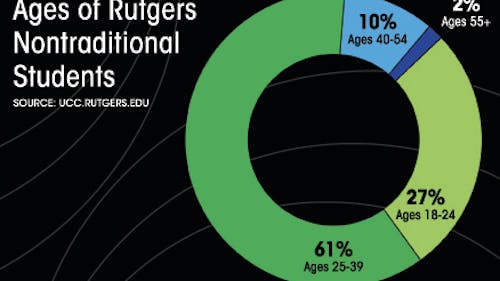Rutgers nontraditional students find work-life balance on campus

College students are often stereotyped as budding youths — inexperienced, impressionable and a little naïve. But not all undergraduates at Rutgers are students in the traditional sense.
Some of them are adults seasoned with real-world work experience, family obligations and hardships. Whether they are a few years or decades older than the typical undergraduate, they all have one thing in common: being a nontraditional student.
Last year, a total of 2,507 nontraditional students, ages 18 to 55 or older, were enrolled in Rutgers-New Brunswick, according to the University website.
Among them was Carol Hladun, a former advertising director at The Star-Ledger who graduated with a bachelor’s degree in sociology. While she began her study more than 30 years ago at Raritan Valley Community College, she eventually had to set college aside to prioritize her job and family.
Her experiences brought a different perspective to the classroom. When studying feminism, Hladun was able to tell younger students why it was so important to appreciate feminist leaders in history because she had witnessed the 1960s feminist movement firsthand.
Students like her are supported by the University College Community, which was founded on campus in 2007 to advocate for the needs of adult students.
Susan Schurman, dean of UCC and the School of Labor and Management Studies, said 60 percent of high school graduates begin their undergraduate degree, but only about a third of them actually finish in the traditional four-to-six year time frame.
“There are millions of people out there with some college ranging from a semester to three years or more — but no degree,” she said.
One of the most noticeable differences is that nontraditional students often prefer night classes, which help career professionals like Hladun keep full-time jobs.
“NTS students are the masters of organization,” Schurman said. “They have to be to succeed.”
Feliciano-Berrios said the primary services UCC provides include an online community on Sakai, general academic and personal advising sessions, information sessions and student orientations.
Students who enroll for fewer than six credits do not qualify for financial aid, Feliciano-Berrios said. UCC helps them find part-time employment, childcare services and scholarships.
The staff also reaches out to students via phone and Skype conversations to introduce them to the Rutgers campus, make them feel welcome and give them a strong support system that is tailored to their needs.
When juggling the demands of school and personal life, nontraditional students often seek the help of their families, Schurman said.
Schurman was herself a nontraditional student, starting her career as a bus driver and working her way to a doctoral degree in adult education from the University of Michigan, according to the University College Community website.
“Fortunately my family members were supportive, though I certainly missed a lot of the kind of school and social events for my spouse and my daughter, who was a preteen at the time,” Schurman said.
The inspiration to continue one’s education comes from different places. Her classmates, many of whom were also nontraditional students who had overcome obstacles to be in the classroom, inspired Hladun.
Hladun chose to study sociology because it was her passion to scrutinize the generally accepted philosophies of everyday life.
“I just found the subject extremely fascinating,” Hladun said. “You get to think critically and look at all sides of people and situations.”
Schurman said some nontraditional students are looking to change career paths or become more qualified in their current jobs, but not everyone is motivated by these goals.
“Other people just feel like they didn’t complete their education, and for them it is not about a job or a career move, but about completing the degree,” Schurman said.



